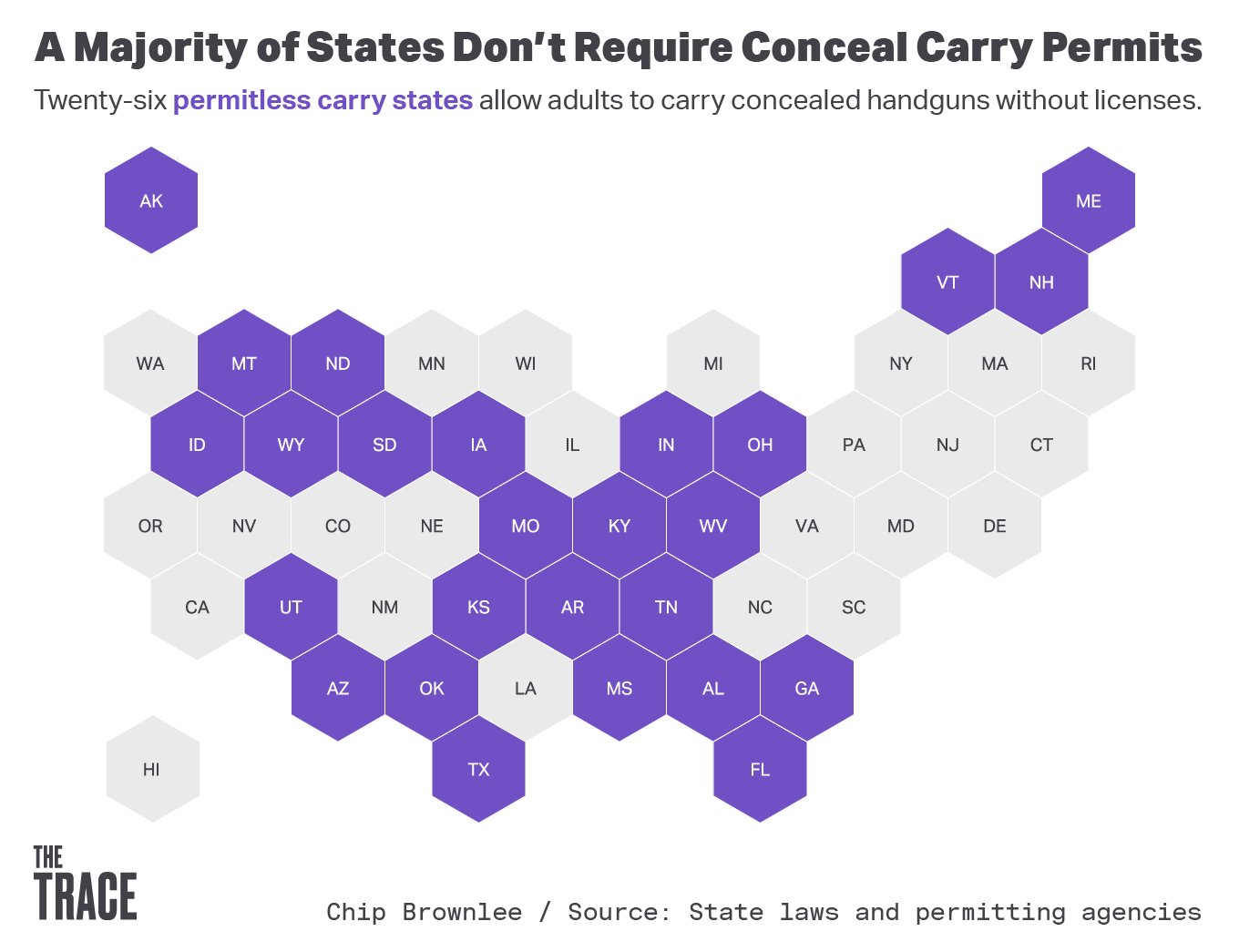Florida Governor Ron DeSantis signed a permitless carry bill into law on April 3, allowing adults in the Sunshine State to carry concealed firearms without training or a license from the government.
“Constitutional Carry is in the books,” DeSantis said in a press release.
With DeSantis’s signature, permitless carry is now the law in more than half of the country. Florida, with a population of 23 million, is the third-largest state in the country and the second-largest to enact permitless carry. Texas, the second most populous state, removed permit requirements in 2021.

Like most permitless carry laws, Florida’s will allow people to carry concealed guns in most public spaces. Some people will still be barred from carrying a gun, including those who are otherwise prohibited from possessing guns under state or federal law, including for a previous felony or domestic violence conviction.
Though a majority of states now allow permitless concealed carry, the majority of the U.S. population still lives in states that require a permit or license to carry concealed firearms. With the addition of Florida, 142.7 million people live in permitless carry states, while 190.5 million people reside in states that retain their licensing requirements.

In nearly every state for much of the 20th century, carrying a concealed gun required a license. Until the 1990s, some states barred concealed carry outright, though a shift toward more permissive permitting systems occurred within the decade. That began to change again in 2003, when Alaska became the first state to pass a permitless carry law and the second to allow concealed carry without a permit, after Vermont, which never required them. In recent years, the pace of states passing permitless carry laws increased dramatically. Since 2021, 11 states have done so.

Permitless carry, or constitutional carry, as proponents refer to it, has been a top priority of pro-gun rights groups, including the National Rifle Association and Gun Owners of America. They argue that the Constitution affords Americans the right to carry a gun in public without a government-issued permit, and that allowing more people to carry concealed weapons serves as a deterrent to crime.
The research on concealed carry is less supportive. A RAND Corporation meta-analysis of studies on concealed carry laws found supportive evidence — the think tank’s strongest designation — that permissive concealed carry laws, including “shall-issue” regimes that leave limited discretion for officials to deny permits, may increase homicides. More limited evidence suggests that they may increase overall violent crime. The evidence on permitless carry laws specifically is inconclusive, largely because of limited research on the policies, according to the RAND analysis.
Last year, the Supreme Court came close to agreeing with the pro-gun groups’ stance on permit requirements in its ruling in New York State Rifle and Pistol Association v. Bruen, recognizing for the first time a right to carry a gun for self defense in public. While the Supreme Court did not rule that permit requirements were unconstitutional altogether, it did rule that states like New York, which operated under a “may-issue” regime that afforded state officials discretion to deny permits, can’t use subjective criteria to determine eligibility.

By removing the requirement for a permit prior to carrying a concealed gun, Florida also effectively nullified its requirement that permit-seekers receive live-fire training before receiving a permit. While permits will still be available for those who want them in order to carry in other states with reciprocity agreements, it’s likely that fewer people will pursue permits, or training.
Gun reform groups roundly opposed permitless carry laws, saying that removing permit requirements increase the chances of gun violence by allowing people to carry guns without training or a background check. Because Florida does not require universal background checks on all gun purchases, like most states with permitless carry laws, someone could legally purchase a gun from a private seller without a background check and carry the gun legally.
“Floridians across the state are going to be less safe because of this bill,” said Samantha Barrios, Florida state director of the gun reform group Giffords. “Law enforcement now won’t be able to identify a criminal from someone who has gone through a background check and training to carry a gun in public. Fistfights will now turn into gunfights.”

